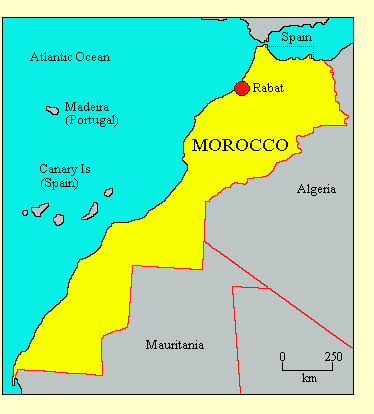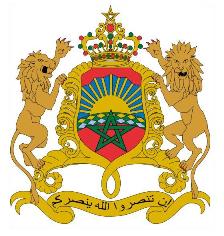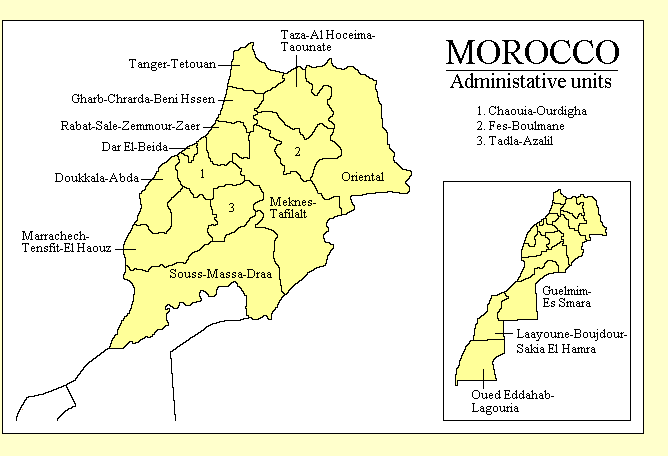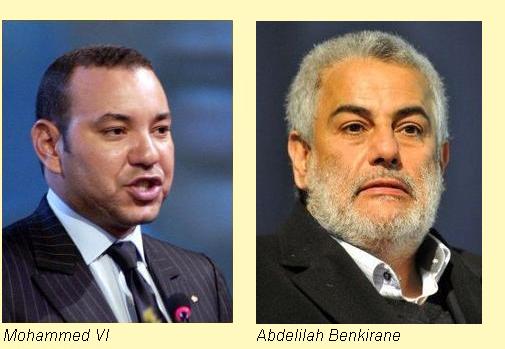

KINGDOM OF MOROCCO
• Official name: Al Mamlakah al Maghribiyah (Kingdom of Morocco). The Arabic name means "the kingdom of the west" (Maghreb). The English name
Mococco comes via Spanish and is a corruption of the city name "Marrakesh."
• Location: North Africa
• International organisations: African, Caribbean and Pacific Group of States, Arab League, Non-Aligned Movement,
Organisation Internationale de la Francophonie, Organisation of Islamic Conference, United Nations, World Trade Organisation
(Morocco is not a member of the African Union because the Union
recognises Western Sahara as an independent state)
• Borders: Algeria, Mauritania, Spain
• Coastline: North Atlantic Ocean, Mediterranean Sea
• Land area: 712,500 Km2
• Population: 32,500,000
• Annual GDP (PPP) per capita: US$4,600 (2009 CIA estimate). World ranking: 117
• Ethnicity: Virtually all Moroccans are of mixed Berber and Arab descent.
There is a small European minority.
• Languages: Standard Arabic is the official language and is nearly universally understood. Most Moroccans speak a
distinct local dialect. Many also speak Berber languages. French is widely used in business and communications.
• Religion: Islam is the state religion and 98% of the population
are Sunni Moslems. There are small Christian and Jewish minorities.
• Form of government: Formally, a constitutional monarchy and parliamentary democracy.
In practice, the King continues to play a guiding role in government and politics.
Morocco is divided into 16 provinces.
• Capital: Rabat
• Constitution: The Moroccan Constitution dates from 10 March 1972, but was
revised in 1992 and 1996.
• Head of state: King
Mohammed VI came to the throne on 23 July 1999.
• Head of government: The Prime Minister, appointed by the King. In theory
the Prime Minister is accountable to the legislature but in practice he is accountable
to the King.

• Legislature: Morocco has a bicameral legislature. The
Assembly of Representatives (Majlis al-Nuwab) has 325 members elected for
six-year terms, of whom 295 are elected from multi-member constituencies and 30 are women elected from national lists.
(This Website is offline.) The Assembly of Councillors (Majlis al-Mustasharin) has 270 members, elected for nine-year terms,
representing local councils and professional and social organisations.
• Electoral authority: Moroccan elections are conducted by the government.
• Freedom House 2011 rating: Political Rights 5, Civil Liberties 4
• Transparency International Corruption Index: 34% (85 of 178 countries rated)
• Reporters Without Borders Press Freedom 2010 Index: 52.6% (135 of 178 countries rated)
• Heritage Foundation Economic Freedom 2010 Index: 59.6% (93 of 178 countries rated)
Political history
Morocco became an independent Arab Sultanate in the 8th century. The Alaoui dynasty, which claims descent from the Prophet
Mohammed, has ruled since the 17th century. Despite efforts at modernisation in the 19th century, Morocco was placed under
a French protectorate in 1912, with a zone in the north allocated to Spain. After World War II Morocco was promised
independence but this was not achieved until 1956, after a long struggle which saw the Sultan Mohammed V deported to Madagascar. In
1957 the restored Sultan restyled himself as a King. The King is a religious as well as
a political leader, holding the title Amir Al-Muminin (Commander of the Faithful).

In 1961 Mohammed
V was succeeded by Hassan II, who promulgated a new constitution. Royal absolutism was
ended and the first Moroccan parliament was elected in 1963. But the facade of
parliamentary government did not alter the substance of royal power. In 1965, following
student riots, Hassan declared a "state of exception" and assumed all legislative and
executive powers. After an assassination attempt in 1972 his government grew more
autocratic.
In the 1980s Hassan's regime was liberalised, partly because the opposition
parties supported him in the dispute with Algeria over the future of the former
Spanish territory of Western Sahara, which Morocco annexed in 1976. Parliamentary
government was resumed and reasonably fair elections were held. But Hassan remained
the real power in the country.
Hassan died in 1999 and was succeeded by his son, Mohammed VI. Mohammed
accelerated the process of liberalisation, freeing political prisoners and easing
restrictions on the media. In 2002 and 2007 elections were held which were fairly conducted,
although most Islamist parties were prevented from participating. Nevertheless the King retains considerable
power under the Constitution, and this is reinforced by his immense wealth and prestige.
Moroccan political parties are weak and have little real authority. The largest party
in Morocco is now the moderate Islamist
Justice and Development Party,
which has displaced the Independence Party, or Istiqlal,
a traditional Arab nationalist party, as the main opposition party. The Socialist
Union of Popular Forces is a moderate social-democrat party. At elections in November 2011, Justice and Development
emerged as the largest party, although the elections were marked by very low turnout. The King then appointed the
Justice and Development leader Abdelillah Benkirane Prime
Minister.
Freedom House's 2011
report on Morocco
says: "Morocco is not an electoral democracy. Most power is held by the king and his close advisers. The monarch can dissolve
Parliament, rule by decree, and dismiss or appoint cabinet members. He controls four sovereign ministries: Foreign, Judiciary,
Islamic Affairs, and Interior. He sets national and foreign policy, commands the armed forces and intelligence services, and
presides over the judicial system... Given the concentration of power in the monarchy, the country’s fragmented political
parties and even the cabinet are generally unable to assert themselves... Despite the government's rhetoric on combating
widespread corruption, it remains a structural problem, both in public life and in the business world...
Although the independent press enjoys a significant degree of freedom when reporting on economic and social policies, the
authorities use the restrictive press law and an array of financial and other, more subtle mechanisms to punish critical journalists...
Freedom of assembly is not well respected, and protests in Western Sahara especially have been controlled through violence and threats...
The judiciary is not independent, and the courts are regularly used to punish opponents of the government."
Updated January 2012
|


